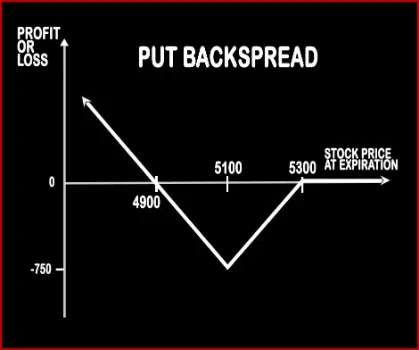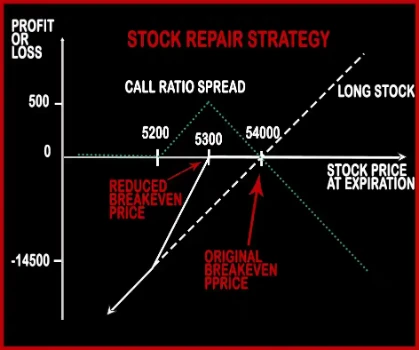Compare Strategies
| PUT BACKSPREAD | STOCK REPAIR | |
|---|---|---|

|

|
|
| About Strategy |
Put Backspread Option StrategyIf the trader is bearish on market and bullish in volatility, he will implement this strategy. However the trader can be neutral in nature i.e. indifferent if the market moves in either of the direction, this strategy will make profits, but uptrend will give a capped income than downtrend which will give unlimited returns. |
Stock Repair Option StrategyStock Repair Strategy is used to cover up for losses made on long stock position. After the long position suffered losses on stock price fall, a trader will implement this strategy in order to bring down the breakeven price and capping his further losses thereby increasing his probability of loss recovery. Suppose Mr. X has .. |
PUT BACKSPREAD Vs STOCK REPAIR - Details
| PUT BACKSPREAD | STOCK REPAIR | |
|---|---|---|
| Market View | Bearish | Bullish |
| Type (CE/PE) | PE (Put Option) | CE (Call Option) |
| Number Of Positions | 2 | 3 |
| Strategy Level | Advance | Beginners |
| Reward Profile | Unlimited | |
| Risk Profile | Limited | |
| Breakeven Point |
PUT BACKSPREAD Vs STOCK REPAIR - When & How to use ?
| PUT BACKSPREAD | STOCK REPAIR | |
|---|---|---|
| Market View | Bearish | Bullish |
| When to use? | Stock Repair Strategy is used to cover up for losses made on long stock position. After the long position suffered losses on stock price fall, a trader will implement this strategy in order to bring down the breakeven price and capping his further losses thereby increasing his probability of loss recovery. | |
| Action | Buy 1 ATM Call, Sell 2 OTM Calls | |
| Breakeven Point |
PUT BACKSPREAD Vs STOCK REPAIR - Risk & Reward
| PUT BACKSPREAD | STOCK REPAIR | |
|---|---|---|
| Maximum Profit Scenario | ||
| Maximum Loss Scenario | ||
| Risk | Limited | Limited |
| Reward | Unlimited | Unlimited |
PUT BACKSPREAD Vs STOCK REPAIR - Strategy Pros & Cons
| PUT BACKSPREAD | STOCK REPAIR | |
|---|---|---|
| Similar Strategies | ||
| Disadvantage | • Management required with all the positions. • Additional loss due to continuous decline in shares as downside risk remains unchanged. | |
| Advantages | • This strategy creates an opportunity to recover losses by lowering our breakeven. • No margin required. • No additional downside risk and costs nothing to put on. |